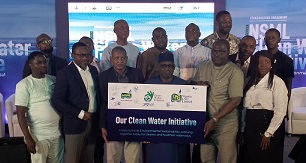By Godwin Chukwumaechi
Abdulkadir K. Ahmed, managing director of NLNG Ship Management Limited (NSML) has warned that the waterways and by extension the world oceans, are in the depths of a plastic crisis.
This is as about 8 million tonnes of plastics and 5 trillion pieces of plastics are found to be in the ocean.
He said that plastics and marine pollution have found their way into every marine ecosystem in the planet, impacting not only economic activities but also the health of the people and the environment.
Ahmed said that scientists had warned that by 2050 there would be more plastics, by weight, than fish in the sea with an ever-increasing level of micro-plastics entering the global food chain.
The NSML managing director gave the warning in Port Harcourt at the NSML Water Initiative programme organised for stakeholders with focus on highlighting the devastating impact of plastics, debris, litters and wastes on the waterways and by extension the oceans.
He explained that the essence of the initiative was not “only highlighting the extent of the problem, but also building consensus and alignment for collective action.
“The expectation is that we will engender open and frank discussion on the malaise of marine pollution, whilst building and developing a broad-based coalition necessary to address the menace going forward,” Ahmed said.
He stressed that the threat of plastic pollution called for action both at the micro and macro levels, adding that in addition to other environmental considerations the United Nations’ Sustainable Development Goal 14 (SDG 14) is focused on the need to “conserve and sustainably use the oceans, seas and marine resources for sustainable development.
“With the oceans covering more than 70% of the surface of the earth, they play a key role in supporting life on earth. The ocean provides natural resources including food, materials, substance and energy.
“Increasing levels of debris in the world’s seas, oceans and waterways is having a major and growing economic impact. Oceans, seas and other marine resources are essential to human well-being and social and economic development worldwide. Their conservation and sustainable use are central to achieving the 2030 Agenda by The International Maritime Organisation (IMO), taking a cue from the United Nations Environment Programme (UNEP), is also working to help protect the oceans and waterways through several projects around the world.
“For us in Nigeria, various regulatory agencies are at the vanguard of championing this important activity. NIMASA’s Revised Maritime Action Plan on Marine Litter and Plastic (MAP-ML+P) Management in Nigeria is designed to achieve the following objectives; to sustainably reduce marine litter in Nigeria’s maritime domain to levels where they do not endanger the marine environment; to achieve a behavioural change of coastal communities and urban dwellers on the dangers of marine litter; to achieve cleaner and healthy oceans through collaborations with stakeholders and to enhance Nigeria’s growth through harnessing of the blue economy as one of the economic strategies”.
In his remarks, Andy Odeh, general manager, External Relations and Sustainable Development said that the clean water initiative was a universal cause, given the importance of water to human existence.
He said; “The Clean Water Initiative campaign for which we are here today, is part of NLNG Ship Management Limited (NSML’s) Corporate Social Responsibility (CSR) initiative to highlight the effects of plastics, debris, and other litter in the waterways in Rivers State.
“The initial scope of this campaign is the company’s primary areas of operation comprising the waterways from the NLNG Jetty in Port Harcourt to its operating terminal in Bonny Island. We are aware that this route has coastal communities whose livelihoods depend largely on the water through fishing and other economic activities,” he said.
Odeh observed that the initiative was borne from the fact that the presence of marine litter in the Bonny–Port Harcourt waterway is increasingly posing a threat to economic activities and creating ecological problems to the aquatic and marine ecosystem.
“The initiative is promoted by NSML as a platform for collaboration with all stakeholders to identify and implement specific programmes and actions to reverse the negative trends and curb the harmful effects of marine pollution in a strategic and sustainable way.
“The initiative adopts a ‘Triple –A’ strategy – Awareness, Advocacy & Action – to tackle the devastating effects of plastics and debris on the national aquatic ecosystem. We believe that together, we can deal with this menace and restore the ecological, economic, and environmental benefits of the waterways through modern and innovative waste management methods”, he added.
Also speaking, Ejiro Ayonuwe, managing director, Tsachal Limited, identified lack of adequate waste management infrastructure as the main driver of indiscriminate dumping of refuse.
He explained that that was the result of the study conducted on the Amadi Ama shoreline, adding that it was also the driver for the behavior of people dumping refuse by the shoreline.
He said; “Now there was a waste collection point at the Amadi Ama round about but some of them in the evenings, find difficult to walk all the way there. So, essentially, that was a primary reason that drove the high incidence of dumping of waste on the shoreline.
So, the summary of this is we can’t talk about marine pollution without talking about good, waste management from land location, because the main drivers for marine pollution is usually solid waste from land activities”.
He advised, “For us to reduce the waste that we get to the waterways the first thing is, awareness, raising the awareness level, two is providing waste collection points.
Without providing those facilities, which are close by the people, that people don’t need to walk more than five minutes, seven minutes, to the waste collection points and then we of course, need a good waste transport system and waste disposal systems. And of course, recycling technology is important. It’s a chain of actions because we can’t stop at waste collection.
And then, it has to be transferred, we have to have transporting trucks, and transported to where, to disposal facilities so we have the disposal technology as well”.
 PH Mundial – Port Harcourt Online Newspaper News Across The Region
PH Mundial – Port Harcourt Online Newspaper News Across The Region





